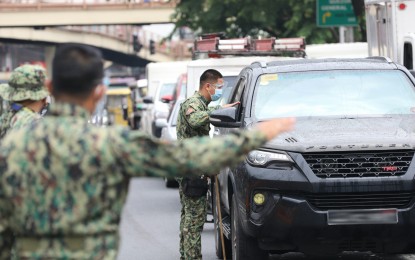
(File photo)
MANILA – The campaign against vaccine hesitancy of the Philippine National Police (PNP) continues to gain success after the number of its unvaccinated personnel with no valid reason dropped from 1,004 to 987 or just 0.44 percent of its entire 225,676 members.
The PNP has also 859 personnel who remain unvaccinated due to valid reasons, mostly medical condition.
“Slowly, we are seeing that there is a narrowing of the gap between those vaccinated and unvaccinated personnel. We hope to convince every member of the more than 222,000 PNP force to be vaccinated to protect themselves and their family from the virus threat,” Carlos said in a statement on Sunday.
According to the PNP Health Service, some 212,024 or 93.95 percent of the 225,676 PNP active personnel have been fully vaccinated against Covid-19.
The data also showed 5.24 percent or 11,828 have received their first dose.
Last week, the PNP also started administering booster shots to its front-liners, including medical personnel.
On Saturday, Carlos said the PNP will soon release a memorandum prohibiting its personnel who remains unvaccinated with no valid reason from reporting to duty.
"We have exerted all effort to convince our personnel to be vaccinated against Covid-19. We understand that this may be a matter of their personal choice but our priority is the general welfare at this time of pandemic,” Carlos said.
Under IATF Resolution No. 148-B, all establishments and employers in the public and private sector shall require their eligible employees who are tasked to do onsite work to be vaccinated against Covid-19.
“Eligible employees who remain to be unvaccinated may not be terminated solely by reason thereof. However, they shall be required to undergo RT-PCR (reverse transcription-polymerase chain reaction) tests regularly at their own expense for purposes of onsite work. Provided that, antigen tests may be resorted to when RT-PCR capacity is insufficient or not immediately available,” the resolution read.
IATF Resolution No. 149, on the other hand, provides that “all partially vaccinated employees in the public and private sector tasked to do onsite work need not undergo regular RT-PCR test at their own expense, as long as their second dose is not yet due pursuant to the interval prescribed for the brand of vaccine received as the first dose.”
A negative RT-PCR results will be submitted “at least once every two weeks,” according to the IATF resolutions.
Carlos said the PNP will still encourage the remaining police personnel to get their jabs done by providing them more helpful information about the benefits of getting the vaccine.
“The way to go is to educate them about the benefits instead of just forcing them. We will invite health experts to have a session with them,” Carlos added.
He said they will also consult the IATF on the extent of consideration for those who may have valid reasons such as health complications.
“But what is clear is that the PNP isn’t exempted from this latest IATF decision and it is our duty to comply. Being law enforcers mean setting an example as law-abiding individuals,” he said. (PNA)
